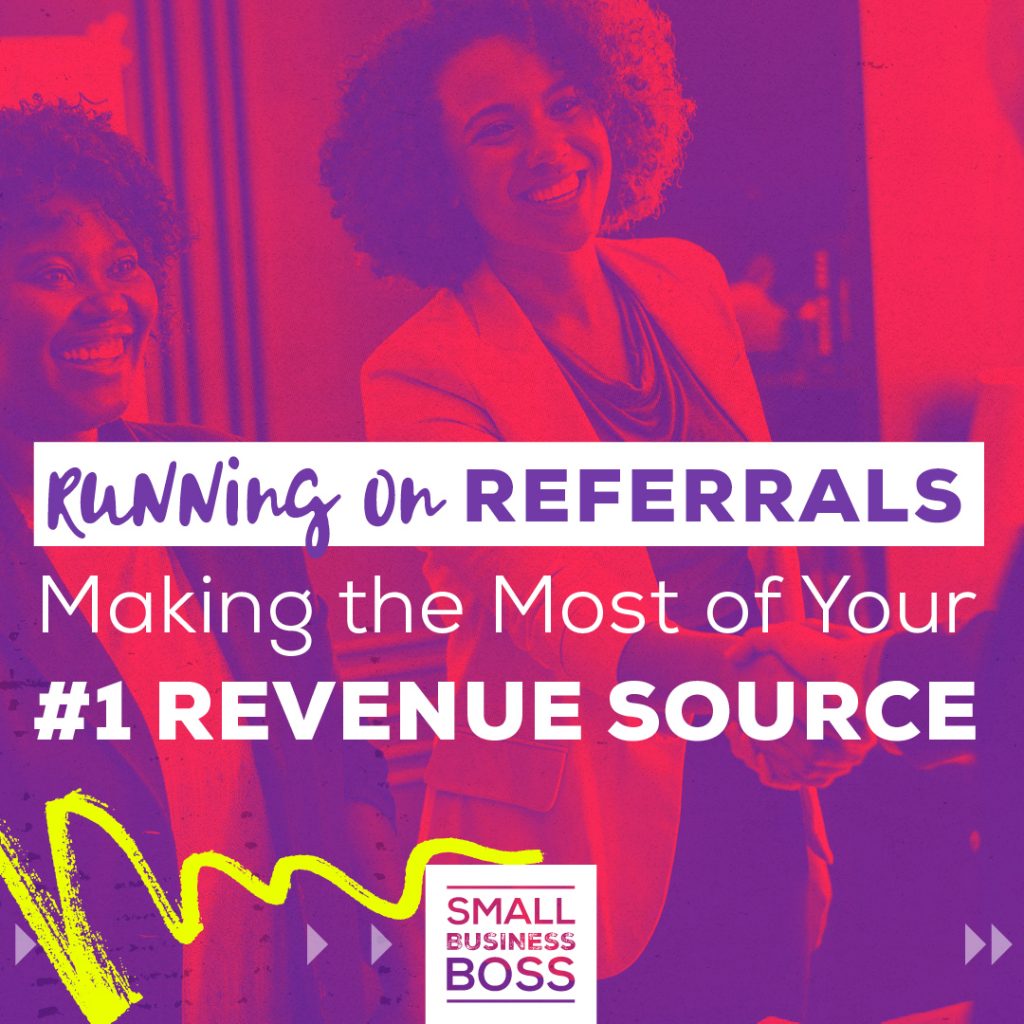
Episode 201: Running on Referrals: Making the Most of Your #1 Revenue Source
I recently asked members of the Small Business Boss Squad what the #1 lead source was for their business, and overwhelming the answer was referrals. In this episode, we’re taking a look at how to make the most of referrals as the key driver of revenue in your business.
On the heels of my epic breakdown of how I found clients in 2019, I wanted to talk about referrals as a way of getting clients. In response to the post, I had many comments and questions about why referrals were the lowest source of revenue for the year.
And it’s a great question, and my experience in 2019, really brought forth some lessons for me, that I wanted to share with you.
Before we dive in, I wanted to call out the fact that for most of you, referrals are the lifeblood of your business. And that was probably the case for me until a couple of years ago when I started being more intentional about my lead generation.
Why We Need to Get Proactive About Lead Generation
In the past I’ve talked about passive versus proactive lead generation, and how many times we all sit back and wait for clients to come to us. I want to call out that this isn’t in any way bad, I know I definitely did this for many, many years, and it worked out just fine.
But here’s the thing. For those years in my business, my revenue didn’t really grow at all. I’d replace clients using referrals when I lost a client, but I didn’t see any meaningful growth year-over-year.
To grow, I had to stop waiting and do the work to get clients in the door. And this is the case for most of us, as the best path ahead is taking control of the process of finding clients.
Plus, when you’re in a proactive mode, you stop feeling like things are up to chance or magic. You eliminate the underlying panicky feeling that comes with waiting for people to come to you. And that is worth its weight in gold.
Now, what you don’t want to do is just start doing a bunch of things randomly so you can cross “proactive” lead gen off your list. Instead, start with being proactive and intentional about your referrals, as they’re already working. Here’s how to do that.
#1. Ask for Referrals
Think about your last few referrals and how they found you. Were they a bit of a surprise? Or are they from people who consistently provide referrals? Or from people you’ve asked for referrals from?
A big reason referrals were only a fraction of overall new revenue for Scoop in 2019 was that we didn’t ask for them. We were dealing with referrals that were incredibly random and just showed up without a real strategy driving them to us.
This stands in sharp contrast to past years where I’m confident in saying new revenue was driven by referrals. And I made a point of asking for referrals consistently from collaborators, as well as past and current clients.
#2. Know Who’s the Best Referral Source
Next up, consider who the right referral sources are for your business. When you’re just starting out, you’re more likely to take referrals from anyone and everyone. But as your business matures and you streamline your services who you get referrals from matters more and more.
Hands down, your best referrals will come from clients who’ve worked with you in the last 12 to 18 months as they’ll have experienced your services first hand. And going back to the “asking” part, ensure you have requested a referral as a follow-up when you offboard clients. If you do more ongoing work, don’t shy away from asking for a referral from a client once you’re three or six months into your engagement and you know they’re happy.
Collaborators or other professionals in your space can also be amazing referral sources, but curate this list of people carefully. You want to build relationships where referrals happen organically, and where you have people that have potential clients for you that will be a fit.
#3. Educate Potential Referrals
In the 15 years I’ve run my business, I’ve been through multiple evolutions. I’ve worked with many different clients, and let’s be real, that can make it challenging for people to keep up with what I’m currently doing. (This is also why your most recent clients are truly the best referral sources!)
Case in point, over the last 18 to 24 months, Scoop’s client base has shifted from working with more small, online-based businesses to mid-sized tech and professional services companies. As a result, referrals coming my way for the last year have reflected a bit of a lag in terms of what it is we do today. Not to mention, our website wasn’t 100% aligned with who our current clientele is.
And that bosses, is why if you’re asking for referrals, you need to make your ask specific and clear. State clearly who makes an ideal client when you do ask. This isn’t pushy, it’s simply smart.
Imagine someone sends you a referral, but it’s sort of random. What happens when you have to reject that potential client from the jump? It’s less likely that your referrer is going to want to send you more of them as it seems like a waste of time.
#4. Don’t Shut Down Referrals
Every single time I see someone talking about how they’re booked out, I cringe. While it’s amazing to be full up with clients for the foreseeable future, this is a surefire way for people to think you’re too busy and won’t need any referrals.
Even if you’re booked up, you don’t want to shut down potential referrals. Instead, talk about when your next opening is. Leave the door open. Just don’t say you’re booked out because I’ve seen this one backfire many times.
Speaking of perception, it’s important that people don’t see you as being “too busy” to need new clients. The truth is that you always need new clients at some point, so be careful with your words, and how you talk about your business. Avoid words like busy or slammed with your potential referral sources as you definitely don’t want them to send your dream client to someone else.
#5. Bring the Wow Factor
Want more referrals? Wow your existing clients so they can’t wait to tell everyone about how amazing you are to work with.
I know this sounds like basic business 101, but it’s harder than it seems. Your job should be to set up an experience where your clients feel taken care of, and their needs are met.
Unfortunately, depending on the industry you’re in, the pre-sales experience and the ongoing client experience as mismatched. Everything is shiny, but once money changes hands it all falls apart. This bosses, is an opportunity for you, as if you’re even half way good at client service and simply do what you say you’re going to do, you’re so much better than the majority of what’s out there.
And finally, be grateful for the referrals you do get. A quick email, a card, or even a small gift can be a great way to say thanks and keep the referrals coming your way.
Links for this episode:
What I learned about finding clients in 2019


